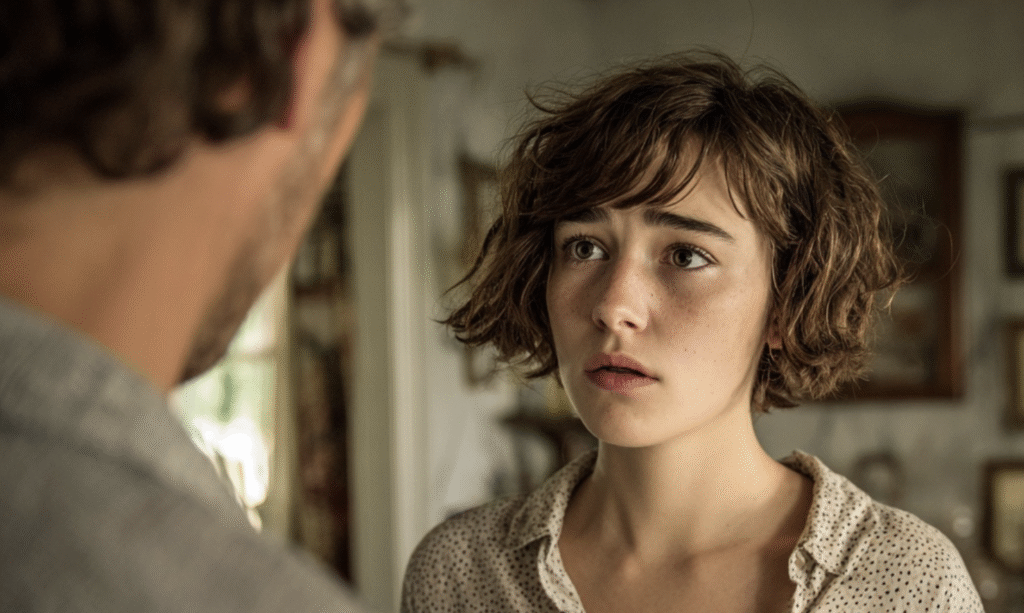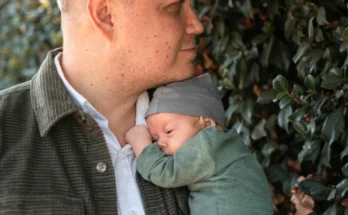Kristina, we need to talk.”
The sound of her husband’s voice from the hallway made her tense inside, though she didn’t show it. She knew that tone too well—a carefully measured blend of fatigue and condescension that always came before trouble. It was the voice of a man who had already prepared his excuses and was now picking the words to present them in the most advantageous way. Kristina didn’t look up from her book, tracing the line with her finger as if completely absorbed in the plot. Let him come. Let him open this game himself.
Andrei walked into the living room but didn’t sink into the armchair opposite the way he usually did. He stayed standing in the middle of the room, shifting awkwardly from foot to foot, as if the expensive rug beneath his Italian shoes had suddenly gone hot. His suit, which always fit perfectly, looked alien on him today, and his face—normally sleek and self-assured—had a grayish cast. He avoided her eyes, studying the pattern on the wallpaper, the spines of books on the shelves—anything to keep from meeting her gaze.
“Here’s the thing… I’ve run into certain financial difficulties,” he began, and Kristina felt everything inside her tighten into a cold, dense knot. His “financial difficulties” were always predictable in essence. They meant he’d slipped up somewhere, and now he needed her resources to clean it up: her patience, her connections, and most often—her personal savings.
She set the book down without a word. That simple motion carried a sense of finality. Now all her attention was on him. She didn’t make it easier for him, didn’t ask any sympathetic questions. She just looked at him steadily and coldly, forcing him to lay all his dirty cards on the table.
“You understand, business is always a game. Sometimes you place a bet and it goes bust. I invested in a very promising project—I was sure it would succeed. But the partners turned out to be… not exactly honorable people. In short, we lost everything.”

He paused, clearly waiting for her reaction. Maybe a sympathetic sigh. Maybe a frightened, “What happens now?” But Kristina said nothing. Her face remained calm and unreadable, like a poker player holding a bad hand and refusing to show it. He always mistook that icy self-control for weakness, never guessing that behind the mask a ruthless analytical engine was weighing every word he said.
When no sympathy came, Andrei apparently decided there was no point dragging it out. He exhaled loudly and finally met her eyes.
“Kristina, all of our joint savings… I put them into it. Into that project. They’re gone.”
Something inside Kristina burst with a deafening crack, but not a sound escaped her lips. The savings. Almost three million they had amassed over five years, the lion’s share of it from her fees and bonuses. She remembered passing on a good vacation, talking herself into driving the old car for another year though she could afford a new one, methodically, month after month, transferring money to their joint account. And he had “invested” it. Just took it and flushed it down the drain.
His remorse was as fake as cheap costume jewelry. You could tell by the way he straightened, as if shrugging off some of the weight. The hardest part, in his view, had been said. Now came the details.
“And that, unfortunately, isn’t all. Besides the money we lost, I’ve got a debt on me. Half a million. It has to be repaid in the next few days, or there’ll be very serious trouble. I know, I’m to blame. These last months have been hell—constant stress, pressure… I just couldn’t take it. I… had an affair. With my secretary. She’s so young, the way she looked at me, she supported me… And, well, one thing led to another. Trips, restaurants, gifts, I rented her a separate apartment so I could just breathe away from all this…” He recounted it as matter-of-factly as if he were talking about buying a new coffee machine for the office.
He dumped it all on her in one stifling, sticky lump. Confession delivered. Now they could move on to “constructive solutions.” And he did, taking a step toward the sofa; his voice found firm, businesslike notes.
“I know I’ve wronged you… But we’ve been through so much together… And… you have to understand and forgive me… Anyway, I’ve thought it through. There is a way out. We need to sell your car. That’ll cover the most urgent part of the debt, and I’ll figure out the rest somehow.”
The silence that followed his proposal wasn’t empty; it rang, dense as compressed air before a storm. Andrei expected anything: shouting, reproaches, tears. He was ready for any of those scenarios; he had prepared answers and counterarguments. But he was not ready for what happened next.
At first Kristina just looked at him, and in her eyes—cold and detached until then—something new began to stir. Her lips quivered, and a short, strangled sound escaped her chest, like a sob. But it wasn’t a sob. The sound swelled into laughter. Quiet at first, then louder, almost hysterical, yet completely devoid of mirth. It was the laughter of someone standing at the edge of a precipice, suddenly grasping the absurdity of their situation. She laughed in his face, head thrown back, and there was so much contempt and bitter mockery in that laughter that Andrei felt uneasy. He would rather she had screamed, struck him—anything but laugh like that.
“‘We’?” she said at last, when the fit had subsided. She wiped an imaginary tear from the corner of her eye, and her voice came out surprisingly even, without a single trembling note. “What an interesting word you chose, Andrei. ‘We.’”
He tensed, feeling the ground slip from under his feet. He tried to regain the initiative, to speak firmly, like a man.
“Kristina, enough. Let’s be adults. I made a mistake, I admitted it. Now we need to solve the problem, not stage scenes.”
She rose slowly from the sofa. There was no haste in her movements, only the cool, precise economy of a predator. She stepped almost close enough to touch, peering straight into his eyes. The laughter was gone, replaced by an expression of crystal-clear, icy fury.
“So—you used our joint money to keep your secretary, bought her gifts and rented her an apartment, and now you’re telling me I should sell my car to pay off your debts?”
There it was. The phrase. The quintessence of the whole farce. It rang through the quiet room like a verdict not subject to appeal. Andrei flinched as if struck.
“That’s not— you’re oversimplifying! It was business! There were risks!”
“Get out,” she cut him off, without raising her voice. It wasn’t a suggestion, nor a request. It was an order. She simply pointed at the door.
His usual swagger returned in a flash. He smirked, trying to reclaim the image of the man in charge.
“Don’t give orders. This is my apartment too, in case you forgot. I’m not going anywhere. We’re going to deal with this together.”
Kristina looked at him the way you look at a pesky insect you intend to remove without dirtying your hands. She didn’t argue. Didn’t shout. She silently took her phone from her jeans pocket, unlocked it, and dialed a number. Andrei watched, smug, certain she was calling a girlfriend to cry to. He even prepared a snide remark. But her next words froze him in place.
“Hi, Seryozha. Can you come over?” She paused briefly, her eyes fixed on her husband’s face. “Yes, right now. There’s some trash that needs taking out. Urgently.”
She put the phone away. The smug grin faded from Andrei’s face, replaced by confusion and then poorly concealed anxiety. Sergey. Her brother. A big, taciturn guy who did semi-legal freight runs and had a reputation for solving problems quickly and without unnecessary talk. Andrei suddenly realized the game was over. And he had lost it.
“What are you doing? You called your thug of a brother? Trying to scare me?”
At last Andrei grasped that things were out of his control. His voice slid off its usual condescending notes into something openly crude and agitated. He took a step toward her, trying to loom, to smother her with the authority he believed still existed within these walls. But he ran into an invisible barrier. Kristina didn’t bother responding. She circled around him as if he were a piece of furniture and walked to the bedroom without a word.
He was left standing in the middle of the living room, feeling like a complete idiot. The air had turned thick and heavy; every second stretched into eternity. From the bedroom he heard the closet door open, the rustle of clothes. What was she doing? Packing her things? Deciding to leave herself? The thought brought him a flicker of relief. Let her go. She’d cool down, come back later, and he—generously—would forgive her.
But when she came out, the things in her hands weren’t hers. She was carrying his expensive leather briefcase—the one with his work documents—and the cashmere coat they’d bought in Milan on their last trip together. She passed him with that same absent expression, reached the hallway, and with a casual swing flung his things onto the mat by the front door. The briefcase thudded against the wall; the coat slid to the floor in a dirty, shapeless heap.
“Are you out of your mind?!” he roared, lunging after her. This was no longer just an insult. It was a desecration of the symbols of his status, his world. He grabbed her above the elbow; his fingers dug into her skin. “I said, cut out this circus!”
Kristina turned her head toward him slowly. She didn’t try to pull free or cry out in pain. She simply looked at his hand squeezing her arm, then raised her eyes to his face. There was no fear in them. Only cold, dispassionate disgust.
“Take your hands off me,” she said quietly—but with such force that he loosened his grip without thinking. In that instant he understood that she wasn’t afraid of him. Not at all. And that realization scared him.
She calmly freed her arm and, without another word, returned to the hallway. She took his jacket off the hook, pulled his shoes from the shelf. She did it all with the methodical precision of a robot executing a cleanup program. Each item tossed to the threshold was a slap in the face. He careened up and down the corridor, shouting incoherent threats, ping-ponging from insults to appeals to her reason. He talked about their years together, about love, about how everyone makes mistakes—but his words bounced off her silence like peas off a wall. She didn’t hear him. She was erasing him.
The fifteen minutes that crawled by before the doorbell rang felt like hell. He was trapped in his own apartment with a woman who had become a stranger, a merciless judge. He no longer wanted to argue or prove he was right. He wanted one thing only—for it to stop.
The sharp, short ring cracked the air like a starter pistol. Kristina, who had been standing by the window, walked over to open the door. Andrei froze in the middle of the room, his heart hammering in his throat.
The door swung open, and Sergey filled the doorway. He looked exactly as Andrei remembered: huge, broad-shouldered, with a face that seemed incapable of expressing anything but grim composure. He didn’t step in immediately. He stood there, blocking the entry, his gaze sliding over the things scattered in the hallway, then stopping on Andrei’s flushed, jittery face, and finally moving to his sister. All the bluster Andrei had been inflating himself with deflated like a punctured balloon. In the presence of this silent giant, his threats and swagger looked pathetic and unconvincing. The air he’d been breathing these last fifteen minutes suddenly ran out.
Sergey didn’t say a word. He stepped over the threshold and quietly closed the door behind him. The click of the lock sounded to Andrei like a coffin lid slamming shut. Kristina’s brother slowly, almost lazily, took in the expensive coat, the designer briefcase, the jacket strewn by the door—then fixed his heavy, unblinking stare on Andrei. There was no anger or menace in it. Only total, absolute indifference—the look of a man who has come to do an unpleasant but necessary job.
A chill skittered down Andrei’s back. He made a desperate attempt to gather the shreds of his authority, to clench his insolence into a fist so he wouldn’t look completely crushed.
“Well, here comes the heavy artillery,” he sneered, speaking to Sergey more than to Kristina. “Came to protect your sister? Do you even know what she’s pulled here? She’s not in her right mind!”
Sergey ignored him. He looked at Kristina, who stood leaning against the wall, and gave a barely noticeable nod, as if receiving confirmation of an order. Then he took one slow step toward Andrei. Just one step, but the corridor, which had felt spacious enough a moment ago, suddenly seemed cramped and narrow.
“You were asked to leave,” Sergey said, his voice low and even, without the barest hint of emotion. It wasn’t a question or a threat. It was a statement of fact.
“This is my apartment!” Andrei snapped—his last line of defense. “I’m registered at this address! You have no right to throw me out! I’m going to—”
He didn’t finish what he was “going to.” Sergey took another step. He didn’t touch Andrei; there was still space between them. But his massive presence pressed in, squeezing out the air. He bent, picked up the cashmere coat, gave it a smooth shake, and held it out to Andrei.
“Get dressed.”
He said it in the same flat tone. And in that calm there was such unshakeable certainty that Andrei understood: arguing was useless. Appealing to law, to conscience, to common sense in the face of this man was like trying to stop a moving truck with your fist. He took the coat from Sergey, dazed. His fingers were trembling. He felt humiliated, naked, despite the expensive suit.
While he awkwardly shrugged into the coat, Sergey silently gathered the rest of his things: he picked up the briefcase, shoved the shoes into Andrei’s hands. Kristina watched the scene with an impenetrable face. She didn’t intervene. She didn’t have to. Her brother was her extension—her will rendered into flesh and muscle.
When Andrei had nearly finished putting on his shoes, he made one last, frantic attempt to wound her, to save a shred of the last word.
“You’ll regret this, Kristina!” he spat, straightening. “You think you’re so strong and independent? We’ll see how you sing when you’re on your own! You’ll be crawling on your knees begging me to come back! And I’ll find myself a normal woman—young, beautiful—someone who’ll appreciate me, not—”
“The door’s that way,” Sergey cut him off again, simply jerking his thumb over his shoulder.
Andrei fell silent. He looked at Kristina, hoping to see something in her eyes—anger, pain, regret. But there was only cold, scorched emptiness. He realized he had lost not just an argument. He had lost her. Completely and irrevocably.
He lunged for the exit, yanked the door open, and, already standing on the landing, turned to fling one more curse. But Kristina spoke first.
“Close the door from the outside. There’s a draft,” she said calmly, and turned away, making it clear the show was over.
The door slammed behind him. He was left alone in the dim stairwell, his things in his arms. Silence settled in the apartment. Kristina exhaled slowly. Sergey stood there for another second, then turned to her.
“Tea?” he asked, as if they’d just finished rearranging the furniture.
And in that simple, everyday question there was more finality than in the loudest of scandals. The trash had been taken out.


